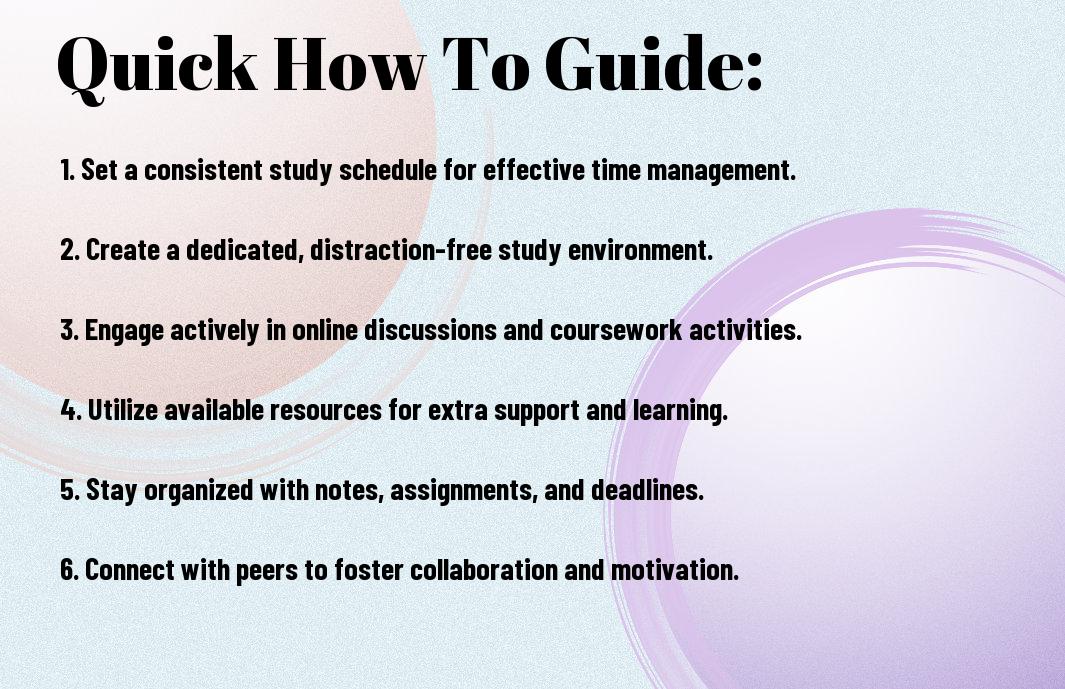As you begin on your online degree program, you’re likely eager to succeed and make the most of your educational experience. You’ll need to develop effective study habits, manage your time wisely, and stay motivated to achieve your goals. Your success in an online program depends on your ability to balance flexibility and discipline, and with the right strategies, you can thrive in this learning environment and set yourself up for long-term success.
Key Takeaways:
To succeed in online degree programs, consider the following points:
- Establish a dedicated learning space to minimize distractions and stay focused on your studies.
- Develop a schedule and stick to it, ensuring you allocate sufficient time for assignments and study sessions.
- Actively participate in online discussions and engage with your instructors and peers to foster a sense of community and collaboration.
- Leverage technology to your advantage, utilizing tools and resources that facilitate organization, time management, and academic success.
- Set realistic goals and track progress, celebrating your achievements and seeking support when needed to maintain motivation and momentum.
Choosing the Right Program
For your online degree program to be successful, you need to select a program that aligns with your academic and career goals. You should consider factors such as program length, cost, and curriculum to ensure it meets your needs.
Researching Online Degree Options
With so many online degree programs available, you can start by exploring different institutions and their offerings. You will find that many universities provide detailed information about their programs on their websites, allowing you to compare and contrast different options.
Evaluating Program Accreditation and Reputation
Assuming you have narrowed down your options, you should investigate the accreditation and reputation of each program. You can check for accreditation from recognized accrediting agencies and look for reviews from current and former students to get a sense of the program’s quality.
Effective Time Management
There’s no doubt that managing your time wisely is key to succeeding in online degree programs. You need to balance your study schedule with other responsibilities and activities, ensuring you allocate sufficient time for learning and assignments.
Creating a Study Schedule
You will find it helpful to plan out your day, week, or month in advance, setting specific times for studying, attending virtual classes, and completing assignments, allowing you to stay organized and on track with your coursework.
Minimizing Distractions and Staying Focused
Typically, finding a quiet and comfortable study space free from distractions is important for effective learning, enabling you to concentrate on your studies and make the most of your time.
Creating an environment that promotes focus is vital to your success in online degree programs. You can achieve this by turning off notifications on your phone, using website blockers to avoid social media, and communicating your study schedule to family and friends to ensure they understand your needs and can support you in staying focused on your goals.
Developing Essential Skills
All online students need to develop skills to succeed in their programs. You can find helpful advice on how to excel in online courses by visiting 7 Tips for College Students to Excel in Online Courses to improve your learning experience.
Improving Online Communication Techniques
Adept communication is key to your success in online degree programs, as you will be interacting with instructors and peers through digital platforms, so you must be able to articulate your thoughts clearly.
Enhancing Technical Skills for Online Learning
Online learning requires basic computer skills, including navigating learning management systems and using digital tools to complete assignments, you will need to be comfortable with technology to succeed.
Techniques such as troubleshooting common technical issues, using online resources, and staying up-to-date with the latest learning management systems will help you to enhance your technical skills, enabling you to focus on your studies and achieve your academic goals, as you progress through your online degree program, you will become more proficient in using technology to support your learning.
Staying Motivated and Engaged
Unlike traditional classroom settings, online degree programs require you to be self-driven. You can find valuable advice on How to Excel in Online Learning: Tips and Real-World Examples to help you stay on track.
Setting Achievable Goals and Rewards
Now that you have started your online degree program, you need to set achievable goals and rewards for yourself to stay motivated and track your progress.
Building a Support Network of Peers and Mentors
Some of the most successful online students are those who build a strong support network of peers and mentors, which helps them stay engaged and motivated throughout their program.
Support from like-minded individuals can make a significant difference in your online learning journey. You will be able to discuss challenges, share knowledge, and learn from each other’s experiences, helping you to stay focused and driven towards achieving your academic goals. As you progress, your support network can provide valuable guidance and encouragement, celebrating your successes and helping you overcome obstacles, ensuring you get the most out of your online degree program.

Navigating Online Course Materials
Many online degree programs offer a wide range of course materials, including videos, readings, and interactive modules. You will need to navigate these materials effectively to succeed in your program. Your ability to access and utilize these resources will impact your learning experience.
Understanding Online Course Formats and Requirements
Now that you are enrolled in an online degree program, you need to understand the different formats and requirements of your courses. You will encounter various types of assignments, quizzes, and exams, and it is crucial to familiarize yourself with the expectations of each course.
Utilizing Digital Resources and Tools
Tools such as online libraries, discussion forums, and video conferencing platforms are available to support your learning. You can use these tools to interact with your instructors and peers, access course materials, and submit assignments.
Utilizing digital resources and tools effectively is key to your success in online degree programs. You can use online libraries to access academic journals and books, and video conferencing platforms to participate in virtual classes and discussions. By leveraging these tools, you can stay organized, engaged, and connected with your academic community, ultimately enhancing your online learning experience.
Overcoming Common Challenges
After enrolling in an online degree program, you will encounter various challenges that may hinder your progress, but with the right strategies, you can overcome them and achieve your academic goals.
Managing Stress and Burnout
For instance, finding a balance between academic and personal life is imperative to managing stress and preventing burnout, as you will need to prioritize your tasks and set realistic goals to maintain your well-being.
Seeking Help When Needed
Stress and difficulties are inevitable, but you can mitigate their impact by seeking help when needed, and your institution’s support services are available to assist you in overcoming any challenges you may face.
Help is available to you throughout your online degree program, and you can access various resources, such as academic advisors, online tutors, and mental health professionals, who can provide you with the support and guidance you need to succeed in your studies.

Conclusion
Upon reflecting on your journey through online degree programs, you will find that your success is rooted in your ability to stay motivated, manage your time effectively, and leverage available resources. You have learned to harness the flexibility of online learning to fit your unique needs, and by doing so, you have set yourself up for achieving your academic goals. As you move forward, you will continue to grow and excel in your pursuits.
FAQ
Q: What are the key characteristics of students who excel in online degree programs?
A: Students who excel in online degree programs typically possess strong self-motivation, discipline, and time management skills. They are able to create a dedicated study space, free from distractions, and establish a routine that allows them to stay on top of their coursework. Additionally, they are proactive in seeking help when needed, effectively utilizing resources such as online forums, virtual office hours, and support services. By being organized, flexible, and committed to their goals, these students are well-equipped to navigate the unique challenges of online learning and achieve academic success.
Q: How can I stay engaged and motivated throughout my online degree program?
A: To stay engaged and motivated, it is vital to set clear goals and deadlines, and to regularly track progress. Breaking down larger assignments into smaller, manageable tasks can help make the workload feel less overwhelming, allowing you to focus on one task at a time. Moreover, participating in online discussions, joining study groups, and interacting with instructors and peers can help foster a sense of community and connection, combating feelings of isolation that can sometimes accompany online learning. Celebrating small victories along the way can also help maintain enthusiasm and motivation, as can exploring real-world applications of the course material to make learning more meaningful and relevant.
Q: What strategies can I use to effectively manage my time and balance academic responsibilities with other aspects of my life?
A: Effective time management is vital to success in online degree programs. Creating a master calendar that outlines all academic deadlines, work commitments, and personal obligations can help you visualize your schedule and make informed decisions about how to allocate your time. Prioritizing tasks based on their urgency and importance, and dedicating specific times of the day or week to studying and coursework, can help ensure that academic responsibilities are met without neglecting other areas of life. Establishing boundaries with family and friends, learning to say no to non-vital commitments, and taking regular breaks to avoid burnout are also important for maintaining a healthy balance between academic and personal life.



